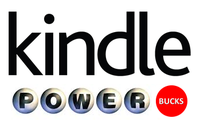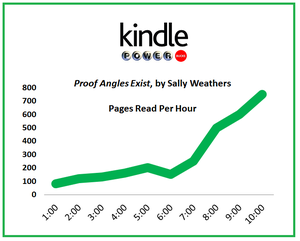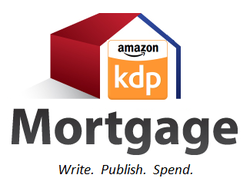Amazon today announced Kindle Power Bucks, a powerful new ebook marketing program for indie authors.
 Kindle Power Bucks solves an age-old problem faced by indie authors - most book marketing doesn't work.
Kindle Power Bucks solves an age-old problem faced by indie authors - most book marketing doesn't work.
If you're an author and you're tired of wasting money on advertising, or sick of prostituting yourself on social media, read on.
If you're a reader and you want to be paid to read books, this program is for you too.
With Kindle Power Bucks(KPB), authors pay readers to read their books. It's the most accountable paid marketing tool I've ever seen.
Here's how it works:
Authors click to their Kindle Direct Publishing (KDP) dashboard, then click on the new KPB bidding tool, then register their credit card or direct bank account for auto-billing, and then click to the book they want to promote.
Next, authors enter the bounty they're willing to pay for each page the reader reads. Amazon calls this the PPP, which stands for Payment Per Page. Rates start at one penny per page. Similar to Google Adwords, the PPP tool will suggest appropriate bids that will help authors attract the most readers. As the final step, authors enter their daily marketing budget for the campaign.
 Authors then click the "FIND ME READERS" button. They then sit back and watch the real-time graphs flicker and unfold as their ebook earns page-reads before their very eyes.
Authors then click the "FIND ME READERS" button. They then sit back and watch the real-time graphs flicker and unfold as their ebook earns page-reads before their very eyes.
It's almost too good to be true. The catch is that this is a paid marketing program. Authors are paying readers to read their book. But at least authors know they're getting read.
Based on early indications, readers and indie authors alike are responding with enthusiasm to the new program.
Amazon reports that indie authors enrolled over 250,000 books into the Kindle Power Bucks program in the first few hours.
The first authors to enroll are already seeing incredible results.
As I write this the morning of April 1, 85 of the top 100 best-selling books in the Kindle Store are Kindle Power Bucks books.
The program makes free books look expensive by comparison.
Kindle Power Bucks offers multiple exclusive program benefits that give KPB authors advantages over authors who choose not to enroll, such as sales rank triple credits. This makes KPB books more discoverable and more desirable to Kindle customers, and earn them more exposure in the also bought recommendations.
Amazon counts each completed book as if it's a full sale to a verified customer, and reports this data to the bestseller lists. This all but ensures the most popular KBP books will earn spots in next week's New York Times and USA Today bestseller lists.
In another innovative twist, partial reads accrue credit toward full reads. For example, let's say a book is 200 pages and the first 100 readers quit after two pages. That would equal 200 pages read so the author would earn a full read credit and the triple credit toward sales rank.
This means authors can start supercharging their sales rank within minutes of enrolling a book in KPB, even if the book isn't good enough to finish.
To further help drive discovery, Amazon makes it easy for readers to search for the highest-paying books in their favorite genres.
Participating authors are reporting that KPB books are earning better reviews than they did prior to enrollment. Perhaps this is because paid readers are happier readers.
Bids Topping $1.00 Per Page
Early bidding is heated as authors compete for readers. Authors in competitive categories are bidding up to $1.00 per page for the highest visibility spots, which means some readers are earning over $300 per book.
It'll be interesting to see how KBP influences reading behavior. Will readers of drier subject categories demand higher payments?
To prevent program abuse and help authors stretch their marketing budgets, Amazon caps the monthly earnings for each individual reader at $10,000. I've heard rumblings that some romance readers have complained this cap discriminates against them since romance readers are known to read multiple books per day.
 If a book's popularity exhausts the author's marketing budget to the point their credit card is maxed out or the available cash in their bank account is consumed, no problem.
If a book's popularity exhausts the author's marketing budget to the point their credit card is maxed out or the available cash in their bank account is consumed, no problem.
Amazon has them covered with an innovative new financing option called KDP Mortgage. Authors can apply online for instant home equity credit lines of up to $500,000.
As with all new changes to the KDP Select program, there will be winners and losers.
"I'm winning," said Hugh Barnacle, a writer of dystopian fiction. "For my book launch this morning, I set my marketing budget at $250,000. Within minutes I topped the charts. It's so easy - anyone with enough home equity can become a bestselling author if they're committed. If I were a lap-sized poodle, I'd be humping Jeff Bezos' leg right now."
![]() Authors with smaller marketing budgets may find their books disadvantaged in the Kindle store as readers modify their reading habits and decide it's more profitable to read books than to purchase books.
Authors with smaller marketing budgets may find their books disadvantaged in the Kindle store as readers modify their reading habits and decide it's more profitable to read books than to purchase books.
Authors may also decide that reading is more profitable than writing.
"I love the new program as a reader, but I hate it as an author," said April Sunshine, a writer of New Age fiction. "First Kindle Unlimited devalued my books by paying only $1.40 per qualified read. Then they devalued my writing further by paying me less than a half penny per page, which means my earnings dropped to $1.00 for full reads in the US and only 25 cents for my books in India. Then they redefined how they define a page and my earnings dropped again. And now Amazon wants me to pay my readers to read my books?!?! Who's going to feed my children? I'm quitting writing to become a full-time KPB reader instead. It pays better. Please tell me this an April Fools joke."
Yes, it is. Sorry.
This post, published on April Fools' Day, is satire.
Here's a link to Mark Coker's 2015 April Fools' post:
